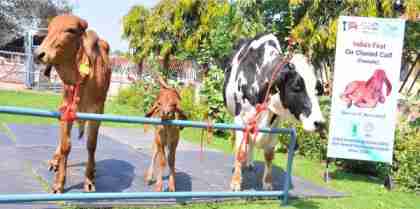In a first for the country, Indian Council of Agricultural Research-National Dairy Research Institute scientists have successfully cloned a Gir cow in Haryana’s Karnal, the institute said on Monday.
Ganga, a female calf of the Gir breed, was born on March 16. Weighing 32 kilograms, the calf is keeping good health and growing well, the National Dairy Research Institute (NDRI) said in its statement.
Indigenous cattle breeds such as Gir, Sahiwal, Tharparkar and Red Sindhi play a pivotal role in milk production and growth of the Indian dairy industry, it said.
“The low productivity of indigenous cows remained a major bottleneck in sustainable dairy production, however, considering their better adaptability under Indian conditions these breeds need multiplication and conservation.
“Globally, the application of assisted reproductive technologies has been acclaimed as rapid and practically feasible for multiplication of superior germplasm. Among the several technologies, animal cloning can play a key role in faster multiplying elite animals and the conservation of endangered breeds,” the statement read.
As part of this move, NDRI-Karnal initiated a collaboration with Uttarakhand Livestock Development Board-Dehradun to work on cloning indigenous cows such as Gir, Sahiwal and Red Sindhi in 2021.
A team of scientists comprising Dr Naresh Selokar, Dr Manoj Kumar Singh, Dr Ajay Aswal, Dr SS Lathwal, Dr Subhash Kumar, Dr Ranjeet Verma, Dr Kartikey Patel and Dr MS Chauhan worked for over two years to develop an indigenous method to produce cattle clones.
“Under this ambitious project, a cloned Gir female calf named Ganga weighing 32 kg was born on March 16, 2023, and is growing well,” the statement read.
“Gir, a native breed of Gujarat, is becoming popular among the dairy farmers because of its docile nature and goodness of milk. Gir cattle are very hardy and well-known for their tolerance to conditions of stress and resistance to various tropical diseases.
“Outside India, Gir cattle are also very popular and have been exported to Brazil, the United States, Mexico, and Venezuela for the development of zebu cows (a cow breed),” it said.
Indian Council of Agricultural Research (ICAR) Director-General Dr Himanshu Pathak said, “Our indigenous animals are disease-resistant and well-adapted to the hot and humid climate of the country”.
Pathak, who is also secretary of the Department of Agricultural Research and Education, added, “I congratulate the team for their innovative approach in developing an indigenous method for cattle cloning. I am hopeful that team will continue their research for the refinement of technology and will produce more cloned cow calves.
“The technology has potential to meet the requirement of higher milk producing indigenous cattle for Indian dairy farmers.” ICAR-NDRI Director and Vice-Chancellor Dr Dheer Singh said, “The achievement will assist us to expand and initiate research activities for the cloning of cattles in India.
“The developed technique will bring new dimensions to our scientific efforts to produce quality indigenous dairy animals, and the farmers will be benefited.”
Source : PTI March 27th 2023

